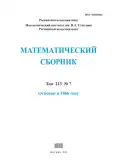Volume 213, Nº 7 (2022)
- Ano: 2022
- Artigos: 4
- URL: https://journal-vniispk.ru/0368-8666/issue/view/7491
Behaviour of Birkhoff sums generated by rotations of the circle
Resumo
For continuous functions $f$ with zero mean on the circle we consider the Birkhoff sums $f(n,x,h)$ generated by the rotations by $2\pi h$, where $h$ is an irrational number. The main result asserts that the growth rate of the sequence $\max_x f(n,x,h)$ as $n \to \infty$ depends only on the uniform convergence to zero of the Birkhoff means $\frac{1}{n}f(n,x,h)$. Namely, we show that for any sequence $\sigma_k \to 0$ and any irrational $h$ there exists a function $f$ such that the sequence $\max_x f(n,x,h)$ increases faster than $n\sigma_n$. We also show that for any function $f$ that is not a trigonometric polynomial there exist irrational $h$ for which some subsequence $\max_x f(n_k,x,h)$ increases faster than the corresponding subsequence $n_k\sigma_{n_k}$.We present applications to weighted shift operators generated by irrational rotations and to their resolvents. Namely, we show that the resolvent of such an operator can increase arbitrarily fast in approaching the spectrum.Bibliography: 46 titles.
Matematicheskii Sbornik. 2022;213(7):3-38
 3-38
3-38


Entropy of a unitary operator on $L^2(\pmb{\mathbb{T}}^n)$
Resumo
The concept of the $\mu$-norm of an operator, introduced in [28], is investigated. The focus is on operators on $L^2(\mathbb{T}^n)$, where $\mathbb{T}^n$ is the $n$-torus (the case when $n=1$ was previously considered in [29]). The main source of motivation for the study was the role of the $\mu$-norm as a key tool in constructing a quantum analogue ofmetric entropy, namely, the entropy of a unitary operator on $L^2(\mathcal X,\mu)$, where $(\mathcal X,\mu)$ is a probability space. The properties of the $\mu$-norm are presented and some ways to calculate it for various classes of operators on $L^2(\mathbb{T}^n)$ are described. The construction of entropy proposed in [28] is modified to make it subadditive andmonotone with respect to partitions of $\mathcal X$. Examples of the calculation of entropy are presented for some classes of operators on $L^2(\mathbb{T}^n)$.Bibliography: 29 titles.
Matematicheskii Sbornik. 2022;213(7):39-96
 39-96
39-96


The predicate version of the joint logic of problems and propositions
Resumo
We consider the joint logic of problems and propositions $\mathrm{QHC}$ introduced by Melikhov. We construct Kripke models with audit worlds for this logic and prove the soundness and completeness of $\mathrm{QHC}$ with respect to this type of model. The conservativity of the logic $\mathrm{QHC}$ over the intuitionistic modal logic $\mathrm{QH4}$, which coincides with the ‘lax logic’ $\mathrm{QLL}^+$, is established. We construct Kripke models with audit worlds for the logic $\mathrm{QH4}$ and prove the corresponding soundness and completeness theorems. We also prove that the logics $\mathrm{QHC}$ and $\mathrm{QH4}$ have the disjunction and existence properties. Bibliography: 33 titles.
Matematicheskii Sbornik. 2022;213(7):97-120
 97-120
97-120


Semiregular solutions of elliptic boundary-value problems with discontinuous nonlinearities of exponential growth
Resumo
An elliptic boundary-value problem with discontinuous nonlinearity of exponential growth at infinity is investigated. The existence theorem for a weak semiregular solution of this problem is deduced by the variational method. The semiregularity of a solution means that its values are points of continuity of the nonlinearity with respect to the phase variable almost everywhere in the domain where the boundary-value problem is considered. The variational approach used is based on the concept of a quasipotential operator, unlike the traditional approach, which uses Clarke's generalized derivative. Bibliography: 29 titles.
Matematicheskii Sbornik. 2022;213(7):121-138
 121-138
121-138










